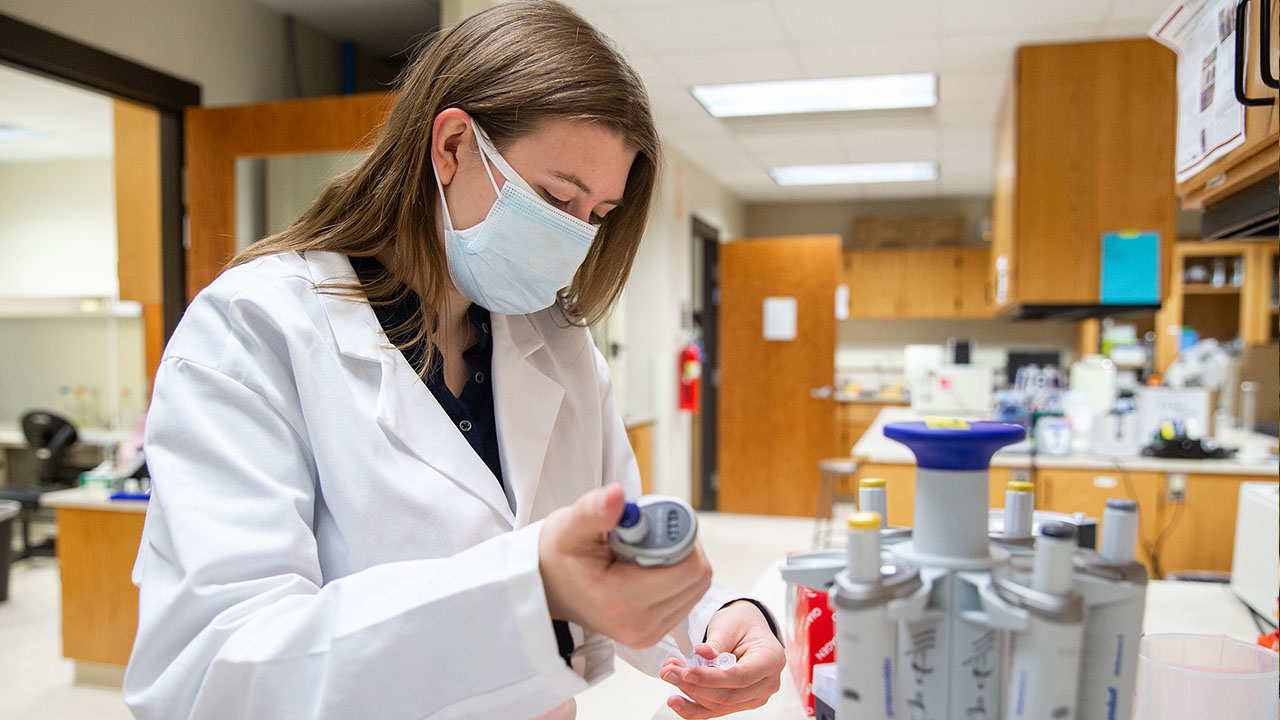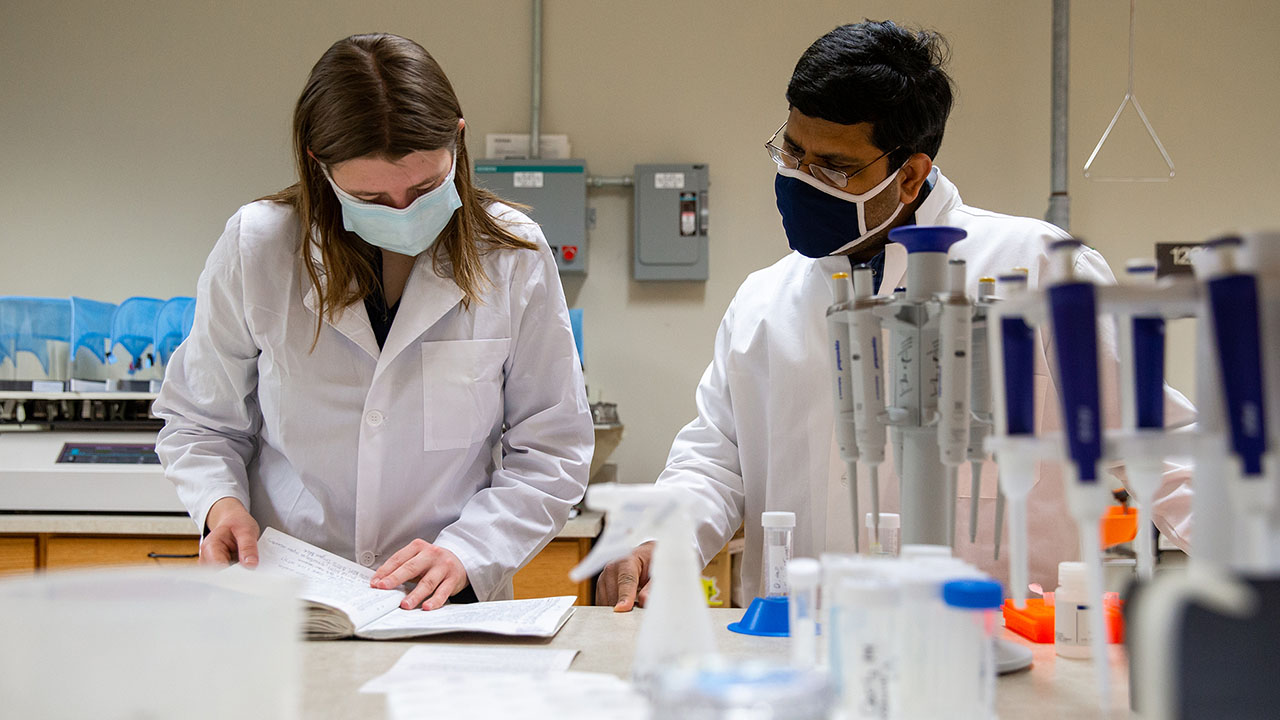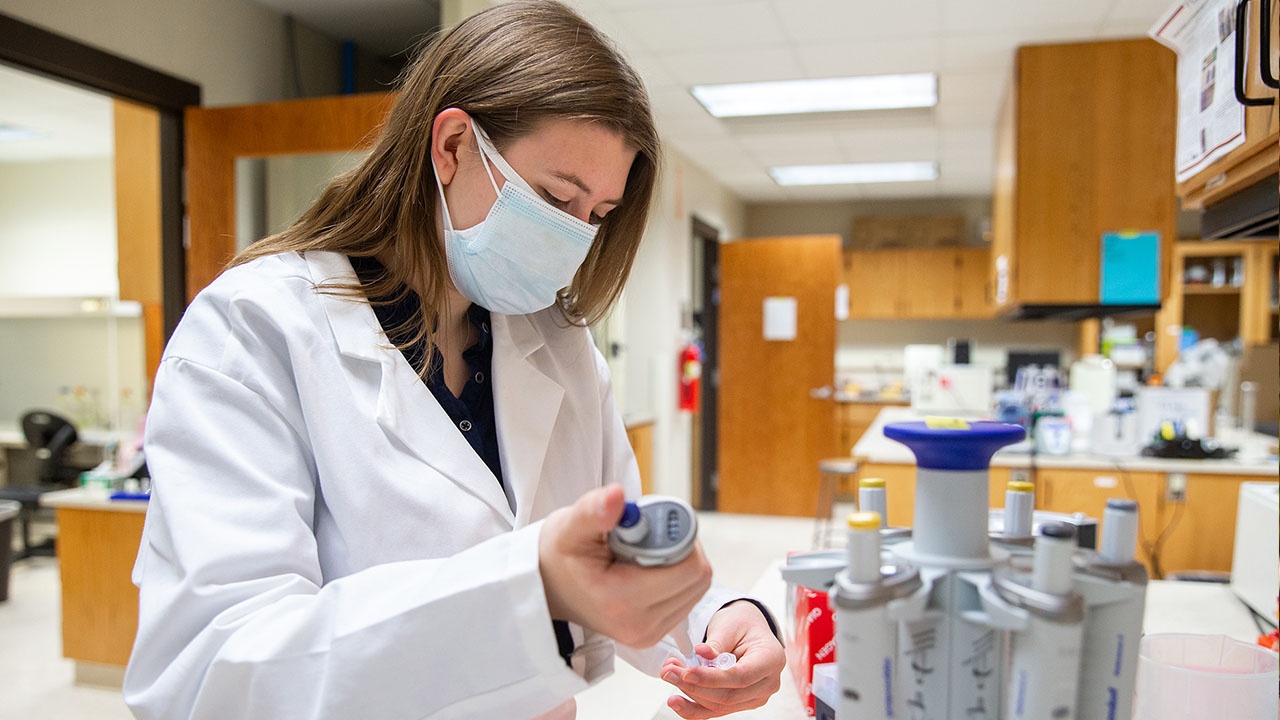


Often reserved for upperclass students at many universities, research has been a part of Kaylee Finseth’s college experience since nearly the time she first stepped foot on campus at the University of Wisconsin-Platteville. Now a junior, the Verona, Wisconsin native has been engaged in several research projects involving plant-microbe symbioses for the past three years.
Finseth, who is double majoring in soil and crop science and environmental horticulture, with an emphasis on plant breeding and genetics, has been working under the mentorship of Dr. Muthu Venkateshwaran, associate professor of crop physiology and molecular biology, as one of seven students conducting advanced-level research in his lab this semester. This includes research that is funded by the prestigious CAREER Award from the National Science Foundation. Granted to Venkateshwaran in 2019, this was the largest award in the School of Agriculture’s 100-year history, and funds up to five years of research in the area of plant-microbe symbioses.
Finseth also spends time on two other research projects in the lab, including one that investigates the molecular mechanisms of how big trees – such as poplar – associate with beneficial, soil-living fungi, known as ectomycorrhizal fungi. In this symbiotic association, ectomycorrhizal fungi help trees with mineral nutrition, fight against pathogens and build increased tolerance to a wide range of environmental stresses. Finseth said the research could contribute to a broader objective of reducing the reliance on fertilizer in the agriculture industry.
“We are looking at what genes are required for this vital symbiosis in poplar and what happens if we mess around with those genes a little bit,” explained Finseth. “For example, we’ve used RNA interference (RNAi) to silence the expression of three candidate genes in poplar, or at least tamp down on their transcript level. This gives us a better look at if it affects the mycorrhizal colonization or not. We hope that the knowledge gained through the functional characterization of symbiotic genes can be applied to a broader range of crops including bioenergy crops used in agroforestry.”
In a third project, funded by the UW-Consortium for Extension and Research in Agriculture and Natural Resources, Finseth and other students are investigating the effects of prescribed burn in prairies on soil nutrient profile, soil microbiota and revegetation success. It is a collaborative project between Venkateshwaran; Dr. Christopher Baxter, professor of soil and crop science, and Reclamation, Environment and Conservation program coordinator at UW-Platteville; Dr. Thea Whitman at the University of Wisconsin-Madison; and Dr. Yari Johnson at the U.S. Army Corps of Engineers. The research team has utilized microbiological, molecular and metagenomics approaches in accessing the dynamics in the soil microbiota after the prescribed burn. They have identified key fire-responsive bacterial and fungal communities that influence revegetation in prairies.
“I usually have a few cohorts of students in my lab who work together as teams pursuing research on multiple projects since their very first semester on campus or when they transfer to the Soil and Crop Science program,” said Venkateshwaran. “Over the years, I see them gaining expertise in various techniques pertaining to plant biotechnology, molecular biology, plant pathology and microbiology. Senior students in my lab are given opportunities to peer mentor new students. With the meticulous selection of coursework combined with the research skills they acquire over the years, many of them have gained graduate student-level caliber in pursuing research in their respective projects and this gives me immense level of satisfaction and a sense of accomplishment as their mentor.”
Finseth said she has recognized multiple benefits of being involved in long-term research.
“It’s always nice to have hands-on work, but for me, it has also really helped solidify a lot of the concepts I have learned in class,” she said.
Another thing the research experience helped solidify is her post-graduation plans. Finseth said she plans to attend graduate school, and while her long-term goals aren’t firm yet, she is leaning toward eventually working in academia herself.
Finseth’s advice to any incoming students interested in research is to reach out and discuss the topics with professors.
“I have found that a lot of professors, if asked about research opportunities, will say yes,” she said. “Professors at UW-Platteville want you to have a well-rounded experience and will help you succeed in any way they can. If they think you would enjoy it and benefit from being in their lab, along with helping their research, they want you to have the opportunity.”